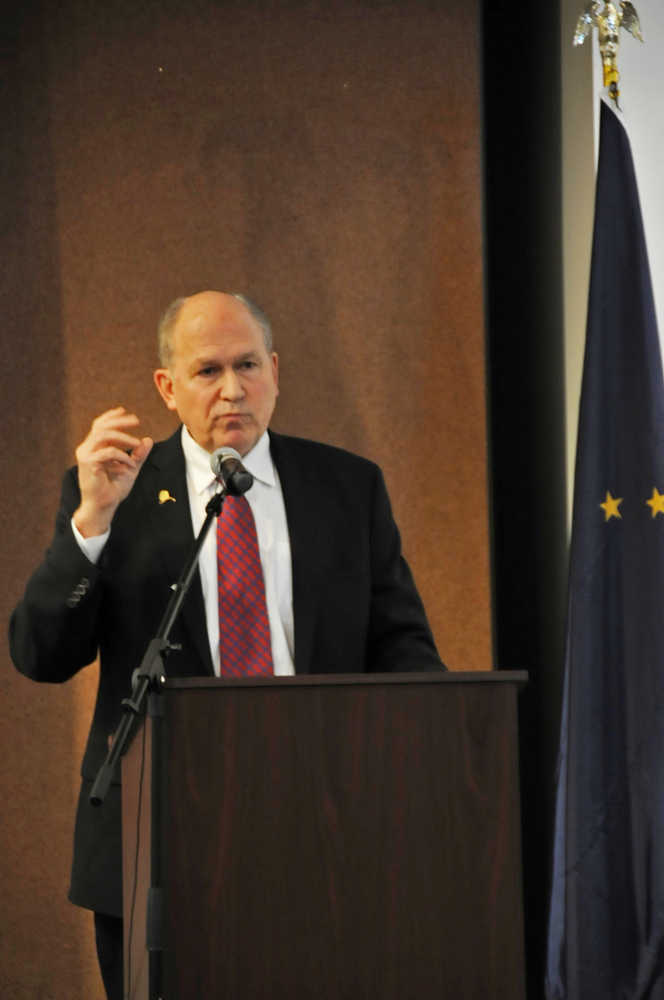Gov. Bill Walker is calling this year’s legislative session the “fix Alaska” session and next year’s the “build Alaska” session.
On a visit to the Kenai Peninsula on Thursday, the governor updated members of the public on progress closing the budget deficit so far. He affirmed that the Legislature must make significant progress to close the gap this year in order to solve the budget crisis by 2019.
“I’ve always said our plan is in pencil, not pen, and it is,” Walker said in an interview with the Clarion. “The part that’s in pen is to get it done now. Sitting back and saying, ‘We’ll get it done the next year or the next year’ isn’t acceptable to me.”
With twelve days of the Legislative session left to go, Walker predicted that they would likely go into a special session to solve some of the budget issues but said he was still hopeful they would finish in time.
He said he would like to see the Legislature formulate a plan for Alaska’s future this year before closing out the session. The budget, as developed so far, is $4.7 billion, a significant reduction from the more than $8 billion budget in 2013. One of the most urgent reasons to develop a plan is that solving the shortfall becomes more expensive in the future if the Legislature does not act this year, Walker said.
In various town hall events across the state, he said he has seen a consistent pattern that Alaskans are beginning to understand the scope of the budget deficit. Many have offered solutions and suggestions, which he said he would take back to his administration.
“One of the biggest challenges we had a year ago … was helping Alaskans understand the magnitude of the situation we are in,” Walker said. “Until you recognize you have a problem, it’s really hard to work on a solution.”
Taxes have been a big topic of conversation and debate across the state.
Walker said even if the Legislature passes all the current tax bills on the table, Alaskans would still have the lowest tax burden in the country and would still receive an Alaska Permanent Fund dividend. The plan he has proposed would set the PFD at the average amount of about $1,000, but it would help preserve it so the program does not disappear entirely in a few years, he said.
Walker said he favors an income tax over a sales tax, though it was a relatively close call. A sales tax might also impact rural areas more than urban areas, he said.
“The other piece, that was sort of deciding piece for me a bit, (was that) we have about $2.6 billion of wages a year earned by out-of-state workers,” Walker said in an address to the joint Kenai and Soldotna chambers of commerce. “We wanted to welcome them into the solution and we wouldn’t get that on a sales tax. We would on an income tax.”
He said Alaskans have been vocal about their ideas for a solution. When a member of the public at the joint chamber luncheon asked Walker about potentially installing a toll road on the Kenai Peninsula to gather some revenue from summer visitors, he said he had not analyzed it but would suggest it to the Department of Revenue. One of the challenges, he said, is to determine ways to collect revenue that bring in more money than it costs to collect the fees.
The same is true of oil and gas tax credits. Walker said he wants to cap oil and gas tax credit payouts, the third most expensive part of the state budget, because they cost more money than they bring in.
While pro-development overall, he said the credits are on track to cost more than $1 billion next year, which the state cannot sustain.
The state has funded up to 85 percent on some projects, he said.
“We need to make sure that it makes economic sense and it’s sustainable,” Walker said in an interview with the Clarion. “That’s the challenge we have right now with no limits on the amount.”
At the same time, Walker said he is still very focused on developing the Alaska LNG Project. However, balancing the state budget is critical for encouraging investment — investors might be deterred from entering an Alaska project if the state is on the brink of a fiscal cliff, he said.
One area that will affect all businesses in the state is the drastically rising cost of health care. Walker said the state is considering some incentives on health care and wellness to try to reduce costs on individuals and insurance premiums, but he said the state needs to address the escalating costs of actual medical procedures.
“There’s something really wrong that the cost of certain procedures in Alaska are 500 or 600 percent of what they are in Seattle,” Walker said. “We need to look at ways we can bring down the cost of health care. … Health care drives the cost of education, the cost of government. It impacts every budget out there.”
Walker said the answers to the questions the state government has to face this year are “right in front of us.” The decisions are uncomfortable, but not hard, he said.
“A lot of people have said to me, ‘Sorry you’re governor right now,’” Walker said at the chamber luncheon. “On the contrary, I’m very happy I’m governor right now.”
Reach Elizabeth Earl at elizabeth.earl@peninsulaclarion.com.

